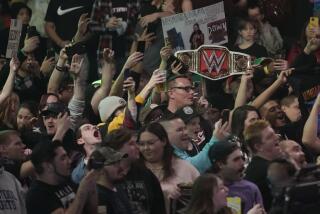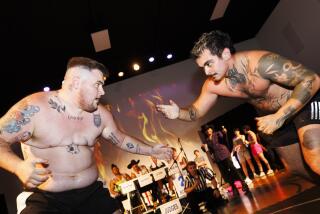Company Town : Ted Turner Locks Horns With WWF
- Share via
Forget about alliances with a home shopping network and sophisticated forays on the information superhighway. After conquering cable television, Hollywood and the world of professional sports, Ted Turner wants to put a body slam on the World Wrestling Federation.
The cable mogul is spending liberally to make his World Championship Wrestling a serious challenger to the WWF, which has dominated the mat for more than 10 years. So set is Turner on victory that he’s even trying to wrestle the legendary champion Hulk Hogan back into the ring.
Turner’s motivation is partly personal, since he wrestled in high school and calls himself a committed fan. He may also see a rare opportunity to gain the upper hand in the battle of the bulging, with WWF owner Vincent McMahon Jr. on the ropes, proclaiming his innocence against charges that he illegally distributed bodybuilding steroids.
“We’re in the sports business and I consider wrestling sports,” Turner said. “It’s sports-o-tainment. Why put any limitation on it? We want to be the champs.”
Professional wrestling, with its staged fights and pumped-up rivalries, made a major comeback in the 1980s, thanks to cable and pay-per-view TV. It still generates annual gross revenue of $500 million to more than $1 billion, though some feel it is in decline.
Turner acquired WCW in the 1970s and used it as a programming cornerstone of his TBS Network. Only recently has he started making serious noises about challenging his bigger rival. Eric Bischoff, WCW’s executive producer, said the network’s wrestling events routinely draw higher ratings than Turner’s sports teams or reruns of popular sitcoms.
*
One reason apparently is the money spent on the wrestling presentations. “It compares with the production values of everything else for sale,” Bischoff said. “We’ve dressed the arena more. We’ve added cameras. We use digitally enhanced audio . . . sophisticated graphics.”
While TBS doesn’t separate out wrestling revenue or costs, the relatively cheap programming can be endlessly repackaged for syndication. Live, pay-per-view events are also big moneymakers. Bischoff says the company will produce 400 hours of matches this year alone.
Getting Hogan back into the ring would go a long way toward raising WCW’s profile. The 6-foot, 6-inch star, who inspired a $1.7-billion merchandising empire at the height of his popularity, lately has shown more interest in acting than wrestling, but his Los Angeles attorney called the WCW talks promising.
“We are in very, very serious discussions with Turner. It will be an unprecedented deal if it happens,” said the attorney, Henry Holmes. He indicated that the agreement would cover entertainment and merchandising as well as Hogan’s wrestling performances.
Turner has already invested heavily in other celebrity wrestlers. One WCW star is Sting--not the singer, but a bleached-blond native of Venice, Calif., with a painted face whose fans are called “Little Stingers.” His WCW colleagues include Ric (Nature Boy) Flair, Dusty (The Natural) Rhodes, the Nasty Boys, Ravishing Rick Rude and Jesse (The Body) Ventura.
*
Turner, who, by his own account, wrestled without much success as a teen-ager, says that all these moves to build the WCW have the WWF on the run. “We’re getting our act together,” he said. “It’s like the Hawks and the Braves. That took 15 years. But we’re getting to them.”
If so, the WWF is handling the pressure pretty well. Steve Planamenta, the group’s director of communications, says Turner is trying to create an illusion of fierce rivalry.
“If their goal is to improve their product for the benefit of the fans, they’re to be commended for those efforts,” he said, “but we don’t really see them as competition.”
*
Among the “drastic differences” between the two, said Planamenta, is the WWF’s “strong story lines and themes.” He said the WWF also puts on many more live shows each year.
“We are not one leg of a media conglomerate, like the WCW,” he said. “This is all we do. We’re doing two live shows a night almost every night of the week. We will do 100 shows in Europe this year. . . . We’re on more than 200 syndicated stations. Plus, we do five pay-per-view events a year.”
Whether the WWF feels threatened or not, the battle of words between the two groups already is becoming as ugly as any match. Planamenta says Turner’s pay-per-view events are “too bloody.” Turner, referring to alleged steroid use in professional wrestling, makes a point of saying his athletes are “clean.”
“We would love to match drug tests with that organization any time,” Planamenta said. “We have the most comprehensive drug-testing policy in sports or entertainment today.”
More to Read
The biggest entertainment stories
Get our big stories about Hollywood, film, television, music, arts, culture and more right in your inbox as soon as they publish.
You may occasionally receive promotional content from the Los Angeles Times.










